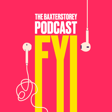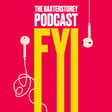Become a Creator today!Start creating today - Share your story with the world!
Start for free
00:00:00
00:00:01

S3: EP2: Empowered to Lead: Louise’s Rise in Hospitality
Starting at a young age in hospitality, Louise Denton saw beyond the myths, recognising the opportunity that the industry can unlock to an exciting career ahead.
Fast forward to being the Regional Managing Director for the South West region, Louise shares her story as she climbed the ranks while taking valuable life lessons and learnings along the way, to ensure she is the leader she always aspired to be.
Listen to Louise's advice to her younger self, her experiences facing imposter syndrome and more. Hosted by Marketing Executive, Ellie Dover; the pair navigate their shared experiences. You won't want to miss this empowering episode in honour of International Women's Day.
Transcript
Introduction to International Women's Day Episode
00:00:09
Speaker
Welcome FYI, the Back to the Story podcast. I'm Ellie Dover, Marketing Executive within Back to the Story and your host for today's episode. This week, we're excited to celebrate International Women's Day as we explore the importance of equality empowerment, not just within the workplace, but within ourselves as well.
Guest Introduction: Louise Denton's Journey
00:00:25
Speaker
We're joined by a very special guest today, Regional Managing Director for our Southwest region, Louise Denton. Louise has been with Baxter Story for 13 years and has spent so much of her career dedicated to the hospitality industry.
00:00:36
Speaker
Personally, I'm so excited for her to share our story with us and you lucky listeners too. Louise, it's great to have you on the podcast. Thank you so much for coming on. Thanks for having me. It's good to be here. Now tell us a little bit about how you got into the world of hospitality.
00:00:52
Speaker
Well, it's a very long story now. I'll try and give you the highlights. So I actually started in hospitality when was 15. got a Saturday job working in a cafe and department store. I also got an evening job as a waitress in a ha hotel.
00:01:04
Speaker
And my mum used to come and pick me up from one. I'd get changed in the car and go to the other. It was quite possibly the richest I've ever been, I think. But just, yeah, did it to earn some money, you know, when kind of going through school and going out the weekend and stuff. And so...
00:01:17
Speaker
but really liked it, kind of got a bit of buzz out of it. But I think at that point, thought, this is a part-time job and I'm going go off to university. It was great expectations in my family to be the first to go to university. It quite a big deal. So I applied to do teaching and journalism at university, thought that's what I wanted to do.
00:01:35
Speaker
And then I didn't get my first choice at university. And then in a flash moment thought,
Career Progression and Hospitality Passion
00:01:41
Speaker
actually, i think I'm going to do hospitality because I really like it, much my parents to spare but that was the compromise that if you're going to go into the hospitality route then at least get a decent qualification goes with it so went to university four years uh had a fab time worked all the way through there as well and left and went and worked in a hotel was my first job worked in hotels for years um so you know seven days a week all that kind of good stuff um but i started a really lovely country house hotel with a very
00:02:11
Speaker
lovely fine dining restaurant and sort of Michelin star and that kind of thing. So really privileged opportunity to to sort of be in, but just loved it. Ended up doing weddings and events, um which generally are really fun and positive and exciting. And so it just kind of got bitten by the bug and and that's, you know, loved it then, love it now, just sort of continued my journey really. And in time, moved out of hotels because it's quite antisocial. Yeah.
00:02:39
Speaker
I worked for a theatre company for a little while, hospitality. I worked in Stadia for a little while as well, which was really interesting. Learned some really significant lessons there. And then navigated my way back the story about 13 years ago into this whole world of contracts and clients, which i didn't even know existed. I think a lot of people don't know exists and how rich and and fun it is.
00:03:00
Speaker
And yeah, as as you said, 13 years and I haven't left yet. I've been presented with lots of opportunity in the business. And you get to kind of use all your skills that you learn growing up through hospitality. That's quite the career and definitely inspiring for people who are in the same position as you are at the moment, working in science, even where
Changing Perceptions of Hospitality Careers
00:03:17
Speaker
we are today.
00:03:17
Speaker
See you where you are is incredible and definitely inspirational. Thank you. When you hear the phrase fell into hospitality, what does that mean to you? And what do you do to pivot certain attitudes towards the hospitality industry?
00:03:31
Speaker
That phrase makes me feel really sad. Totally agree. Because it's still so commonly used, you know it's kind of falling into hospitality. And I think like I said to you at the beginning, when I started out, I didn't fall into it necessarily, but I kind of, you do it thinking you'll then go and do something else. You don't consider it as as a career.
00:03:48
Speaker
And I think actually my first job out of university really cemented it for me. I worked in this lovely country house hotel. where all of the restaurant team and most of the kitchen team actually were French. And they'd all come over from France to work in this really prestigious environment.
00:04:02
Speaker
They took it really seriously, being commie waiter and then being chef de ron and then being maitre d'. And it was a really important career choice for them. And you kind of look at it and go, this is really meaningful. To other people and other cultures, this really means something to them.
00:04:17
Speaker
And we should respect it the same way. So I think the whole falling in thing, that was the moment that I was like, no, no, it's really not. This is a really respectable career with lots of opportunity. And I think it's kind of going circumstance and incident by incident when you're sort presented with that phrase. You know, I think it's a really great career to give you lots of human skills that we're faced with in the public the whole time, you know, and and different reactions, the way people behave and and different emotions and things. And I think it gives you lots of life skills kind of along the way. So, you know, it certainly doesn't need to be the route I took. You know, as to say I say, I went to university because there was this kind of familial expectation that I'd be the first. But I think it's a really easy industry and career to get into to find your niche and the thing that interests you. So I think you can really embrace it and not just...
00:05:08
Speaker
fall in because there's no other choice. I completely agree. I think it's a good starting point and a lot of people can get those jobs to begin with but actually the ones that love it then continue that career. Absolutely. Others go off but when you do have a passion for it, you have a passion for people, passion for food, drink, that's when you don't fall into it. You learn to love it and you learn about that love and I think That's obviously what I can see from you. You can tell that you love it and it's lovely to see.
00:05:33
Speaker
Well, I appreciate that. and I think what's really interesting, like talking to you today, you know, you're you're part of this organisation you have a really different specific skill set that helps kind of then drive on what happens on the floor and actually will help that you help shape the direction in in your role. So it's really exciting. You kind need to point that out to people sometimes that those opportunities are there in different skill sets.
00:05:53
Speaker
What is the one job that has taught you the most?
Leadership Challenges and Styles
00:05:57
Speaker
That's a really hard question. You learn different things as you go through your career at different stages. Perhaps when you move on to a new role, it's because you've identified there's a missing skill set or something. But I think probably the job that taught me the most is one that found the toughest.
00:06:12
Speaker
So I mentioned to you, I worked in in stadia for a little while in very high-end sport. which is an amazing environment. I think anything live is just incredible, whether it's sport, music, it's such an experience to work with it. And, you know, when there's the highs of a team winning, it's incredible. and But actually environment I was in was very, an obvious sport that's that's very visible and in the sort of media and probably quite male dominated at the time.
00:06:34
Speaker
And it was a really tough clinical environment. And I'm quite, probably fluffy is the word people might use. I kind of, You know, like like to kind of have a vision and kind of see how we're going to get there. And the sort of detail and precision is probably for others. i think my team would probably acknowledge that. so I found it a really tough environment to be in. But at the same time, I learned a lot. I learned an awful lot about how to manage P&Ls, finances, all those kind of things.
00:07:00
Speaker
But it was a hard environment because there wasn't the kind of warmth and empathy and kindness attributed for you to to learn those things. I think what it did do is probably help me really get clear about the kind of leader I wanted to be and the kind of environment I wanted to be. it sort of really clarified and distilled that from I think, there. But yeah, when I look at the skills I gained, probably the most in any part of my career, but just a really tough place to be.
00:07:28
Speaker
I think what you said about the leadership you wanted to have, think that's really important in being a woman is that we do have the ability to properly read emotions better. And you're saying as a very male-dominated environment, that's the way they rolled, but actually you kind of learn, actually, that's not how I want to lead. I want to lead with whatever fluffy the word was, but actually it's more that emotional side that we have. And I think that's lovely that you've established that and you realise and you need to have those emotions.
00:07:54
Speaker
moments to realise what you want to do is it going forward so yeah that's lovely have you ever felt certain pressures or expectations as a woman in leadership in a previously male-dominated industry and how has it shaped your career I think when I was younger as first a manager of the department or people or this kind of expectation that that you should be nice because you're woman now absolutely everybody should be nice right and kind and empathetic and supportive and all those things but Just this kind of, you can be nice probably when somebody else has misbehaved and you'll make it nice.
00:08:31
Speaker
I've really struggled with that label because I think it's, you're there to patch up what somebody else has probably been a bit brutal about. You can show kindness in people still buy challenging them and stretching them, but in the right way and not sort of knocking them down to to try and get where you want to get. So I think that's probably the thing that I've seen the most.
00:08:55
Speaker
Firm but fair. Yeah. And I think we're better at that. I think that sort of masculine, feminine dynamic and characteristics are really important to have those in a business. But to pigeonhole that you can only do this thing in this way is is just really limiting.
00:09:11
Speaker
Do you see a shift in how leadership can shape careers? And has this changed since you started? Most definitely. I mean, everything we've just talked about around the characteristics of masculine over feminine.
00:09:25
Speaker
I think there's a real movement, thankfully, to understand that if you are empathetic and actually that, you know, I think what gives you real joy, particularly our business, is the inclusivity and the real commitment and honest commitment towards equity inquality and equality and diversity across our business. And I think that just makes for a better workforce and team in general.
00:09:49
Speaker
So whilst that isn't probably specific to leadership, I think it's about how a business leads in the market. And I think we're a good example of that. i mean, you don't always get it right. Everybody's endeavour is to to be better and and to be inclusive. And I think that movement has really shifted the dial in the last few years.
00:10:06
Speaker
And it's allowed different people to come in and show different skill sets and actually demonstrate that they can be a different type of leader. When I was first growing up, particularly in the hotels and restaurants, It's very hierarchical, which, again, i I have struggled with historically because you absolutely respect those that that know more and actually are in a position of of leadership and accountability.
00:10:26
Speaker
ah think leadership styles are much more collaborative now. And if people feel they can make a contribution, I think that makes for a much safer environment, you know, and and sort of empathy and kindness to people's different characteristics. And that's the other thing I think is...
00:10:40
Speaker
Probably when I first set out, managers managed in a singular way. And actually, if you embrace that people work differently, respond differently to things, actually, you can get a much better outcome. and I think that for me, that's the real positive in how leadership's developing. Yeah, completely agree. i think I've been with Backstory for a couple of years. And what you're saying on the back of coming into the business, you really feel as a woman, and I feel there's a lot of room for, i mean, seeing someone like you work your way up, is it's really inspiring. And I agree with what you're saying I think being with other businesses like you I've worked since I was 15 in pubs and stuff and had multiple jobs at the same time so I think and going from that kind of culture the pub culture the male dominated the things like that i think coming into Baxter's story has actually really made me go wow actually there is a place for women in this industry and this we are really respected and I feel like I have got that opportunity of growth so
00:11:33
Speaker
Yeah, I completely agree. I feel very good here. And you can be yourself, hopefully. And I think that's the difference to what you're describing. Sometimes having a bit of bravado in certain environments, especially when you're finding your way, is necessary. But if you feel you kind of have to be like that all the time and it's not necessarily fully you.
00:11:51
Speaker
What do you feel are important traits that a woman in a leadership role should have? think leadership in general has probably a set of characteristics that maybe work best, but mean, we've touched on it a lot. I think empathy is a huge piece of their understanding what people need to perform for their best work.
00:12:09
Speaker
I think accountability as well is is a key thing. um And also being somebody that's willing to have difficult conversations. You know, I've certainly had that from a couple of really brilliant bosses in the past. and I think just being given feedback that helps you to grow is really important. That's a really responsible thing to do as a leader, I think.
00:12:32
Speaker
And for me, there's an element of kindness in that, that actually you're helping somebody they want to develop and grow. And actually, by providing that feedback, you're doing that, you know. and ah And I think equally, that whole leading by example thing of actually, if we get it wrong as a team, we get it wrong as a team. It's not about singling people out. And I think, again, just referring back to probably how things may have been, it's been about singling people out for for fault. And actually, for me, very much, I believe if we're getting it wrong somewhere in the business,
00:13:00
Speaker
you know, my region, then that that's on me. We kind of need to figure out how we make it right and how we move forward. So I think having the confidence to kind of accept that you are going to fail sometimes, but actually it's about how we address that and move on.
00:13:15
Speaker
There's no weakness in that, you know, I think more leadership could do with that, that you kind of do recognise that. not superhuman. I thought for a long time that you needed to be the one that didn't show any vulnerability and any weakness. And, you know, if you're in that position of leadership, you must demonstrate you've got it together all the time.
00:13:31
Speaker
And whilst there's an element of calmness, I think you need to apply so nobody panics. I think just showing sometimes that you don't always know the answer helps other people realise that you're, you know,
00:13:43
Speaker
Fallible too, infallible is the word. So yeah, I think those much softer emotional skills are the most important thing in leadership. You know, the kind of physical act of the job, you can of learn that and teach that a along the way. you know Yeah, I think going back to what you said about difficult conversations and vulnerability, I think it's really important when you're in a position that you're in, especially as a woman, you can react to who you've
Overcoming Imposter Syndrome
00:14:07
Speaker
got. Like men, they probably want firm but fair, just direct. They might want that fluffy, you know, oh, doing really well, but this is you need to work. And I think reacting to that, who you've got in front of you and being able to deal with that being vulnerable yourself and saying, look, I get it. And like you said, being vulnerable and just relating and...
00:14:26
Speaker
addressing those different scenarios that you're in is such an important skill to have in leadership and a really hard one to have to read those emotions sometimes especially if you've got new people in a team you probably don't know them as well to know where their sort of pressure points are and how they may react to and i mean i think the other thing and we talk about this lot is resilience and i think societally it's really hard as well when we're exposed to so much all the time in our world in hospitality you're exposed exposed to people's emotions a lot as well especially if you're dealing with time pressures of whether it's a service delivery or if it's an event like a wedding. So being resilient and knowing that's not about you sometimes is is a really important skill, a really hard one to develop, I think. Very hard,
00:15:09
Speaker
So I know we touched upon this last International Wednesday, but I think this is a really important one. It's imposter syndrome. And I think being in the position you're in, anyone in the whole entire world would have it. So how have you dealt with that?
00:15:23
Speaker
Yeah, I mean, like I think I quite openly said this last year. I i probably like chronically suffered with imposter syndrome until about, probably about five years ago. don't know that's a woman thing. I talk to lot more women than men that seem to, well, certainly I can admit that they suffer with it for much of my career. Knowing I was doing, I knew I was doing good job and when was delivering well and those things, but just that nagging thing of I'm just going to get found out. Somebody's going to find out that can't do it. And don't where that comes from. don't know why that happens.
00:15:52
Speaker
But I think for me, the shift was I was in a role a few years ago in the business where i was looking after a very big contract with a very big team who were really looking to me to lead them. not Not spoken, you know, sort of openly, but they all believed that I knew what I was doing. And and there was a moment, I think, actually by having their support. Yeah.
00:16:18
Speaker
that did make that melt away that I knew they had my back and I absolutely had theirs. And so you just forged a path together. and that really helped me kind of. And and on days now when I've been in this role for 12 months, you know, you'd say that's a long time. It's not all that long when you're still trying to just find your way a bit. I think that it's the odd day now. And I think, do I know everything? I don't need to know everything actually. And that's okay.
00:16:45
Speaker
And again, I've got team of people that want to come on the journey and support. So it was a real turning point for me that knowing that we've got a really connected team that all wanted to succeed and win.
00:16:57
Speaker
Actually probably were equally suffering with that a little bit themselves and actually making that safe space to to kind of experience it and know that to a degree that's quite normal and it's okay, but actually how do we work through kind of diminishing that so that little voice kind of goes away. But As I say for me, I wouldn't say it's ever entirely gone away, but I think I've learned to manage it. Last year we on the panel Natalie and we talked about the chimp on your shoulder and and kind of telling you it sort of comes out. It's a similar thing, you know, of just you learn to manage it a bit, I think, as you go on.
00:17:30
Speaker
That's really interesting. And you can have all the skills in the world. And if you haven't got that team to support you and you can't be a leader if you're on your own, you can't be a leader if you haven't got that backup. So it's really nice to hear that obviously... Yeah. That takes time. yeah And I think that, you know, I hope some of that journey is what what's led me here. And, you know, I think I learned as well that on that big, big contract, i I put a team around me that had different skills to me, a different knowledge, different sort detailed experience, things that I, you know, I learned a lot from them. You know, some of my grads that were coming through, the experience they were bringing to the team,
00:18:06
Speaker
just awe-inspiring for me and I learned so much from them as well and i think that's the thing when you have this kind of two-way connection yeah it really counts for a lot yeah all got those different skills yeah now have there been any forms of inequality that you've experienced throughout your career I think I've been quite lucky in that I don't feel I've had obvious inequality of going up against one of the boys for a job or something like that so I think and I do consider myself really lucky because I think that's quite rare But a few years ago when i was I was actually in a job and I was promoted in into a new role, I had a brilliant boss actually who I was a manager of site and actually he used to come every week and say, right, talk to me about a stem per head and gross margin and how's the business performing. and
00:18:51
Speaker
And we just were both really excited to have those conversations. The business I was looking after is doing really well. So in time, you do well and you hope that kind of gets recognised. And he offered me opportunity to step into it. And I think because of all that time we'd spent together, we'd got a really good connection. and actually you then got shorthand of how you then go and run the rest of the business.
00:19:09
Speaker
So really exciting and lovely. And I was part of a wider sort of regional team in similar roles. And there was a night when we all went out as a team and went out just for a few drinks, nothing too crazy.
00:19:22
Speaker
Had a lovely dinner. Our boss took us out and off he went home. And I was left with the rest of the team who were all men at the time, who I'd gone with really well and worked with.
00:19:35
Speaker
And I don't know if the drink had emboldened the situation, but they thought it was okay to ask me ah how I'd got my promotion and suggested that there was some kind of nefarious reason as to why. Now that's the unpleasant in itself, but I think for me, it just felt really disappointing that it was assumed because I was a woman And actually, wouldn't matter either way, whether you're a woman or guy actually getting promoted. Everybody should be asked the same question if you're going to that.
00:20:03
Speaker
But just really disappointing that that was the assumption that because I'd probably done something quicker than others, but I'd really put the work in. And you think, I've worked really hard for this, actually. And I've committed to the process and I've learnt and all those things.
00:20:18
Speaker
And this is the assumption that somebody feels that they feel a bit jaded because they can see me doing well and they can only assume the reason is because there's something something else at stake.
00:20:30
Speaker
And for me, that's inequality in the sense of you just wouldn't do that if you're as a guy, you know, and that's disappointing. I think on the that's really sad to hear, but also on the back of saying about the team supporting you being a leader.
00:20:42
Speaker
If you then feel like you've got that them as a team, you can kind of take away from that situation. like What do I do? That's not nice. They think that way. How do I change their perspective? Actually, you haven't got to change their perspective. There's nothing wrong that you're doing. It's their, you know, they need to work on it. And I think as women, we do think well, how can I change that? There's nothing you just do. You just carry on what you're doing, you know, be strong in yourself. yeah And I think if that happened to a man, he'd brush it off and be able to. But because of the previous, how women have been treated in the past, we do overthink it. And, you know, it's not nice to hear.
00:21:21
Speaker
Well, I think it's that thing of, for them, they probably just thought it was banter, that conversation, which is that horrible work that gets banded around, particularly in kitchens. You know, you hear about women working in kitchens and it's it's put down to banter when something's just offensive. yeah So, you know, and I don't dwell on it that, oh, it was this awful experience because actually, as you said, I've gone on and developed and kind of continued to grow in the business.
00:21:42
Speaker
They haven't, by the way, actually. You know, they've chosen to go off and do other things, but I think it is a measure of, that was some time ago and I definitely think the world's moved on quite a lot but it hasn't entirely because you see stuff in the media currently that indicates we haven't entirely moved on yeah so I think calling it out when it happens and that's the probably the one regret I do have is I didn't just like you said ignored it and went actually I'm just going to get on because I know it's not true um but I now I think I would definitely call that out yeah I just it just wouldn't be okay for that
00:22:15
Speaker
yeah good so the advice is if that happens don't feel a change of the out probably stand there like that with yeah not knowing what to say how can we be inspiring female leaders by leaning into feminine energy i think it is finding that harmony actually between where you need to turn on that sort more dominant factor sometimes but i think it is Somebody who is inclusive and collaborative and actually listening is a massive skill, I think, in leadership because you're no longer in a position where you're just using your learned skill in an industry. Actually, you're helping to shape leaders the future quite often.
Inclusive Leadership and Career Advice
00:22:54
Speaker
That's a massive responsibility.
00:22:56
Speaker
So i I kind of go back to, I think, demonstrating kindness and that sort of open door environment that actually it's OK to come and have any conversation. is really important to sort of how we encourage other women.
00:23:10
Speaker
i think probably the example I've just given you, you know, yeah there's an element of calling stuff out as well so on our journey. yeah so that actually those that that follow behind don't have to do that, you know, and that shouldn't necessarily be the case. But I think it sets the tone for women that come behind, but also as men grow up in sort of industries, they can gauge how they want to to manage and lead in the same way.
00:23:34
Speaker
Yeah, I think also we can say men can tap into their feminine energy. Maybe they'll see you dealing with something and be like, oh, you know, they've got actually a good response from that. What are you doing different? And it's great to have, you know, men and women alike on the board because you can deal with those situations differently. You can teach something to them and they can teach something to you.
00:23:52
Speaker
and I think that being able to work as you are and lead as you are, I think is amazing. Well, it's interesting, actually. remember last year when we were on the panel together, Natalie quoted Mo Gowda, actually, when we were talking, on an into interview that he'd done with Stephen Bartlett, actually, and said that if he'd got any regrets of his career so far, it was actually that he hadn't leaned into that feminine energy on that journey and actually how much better of results he may have got in certain scenarios. And actually, it's really powerful for a man to at acknowledge that because it kind of then makes it okay
00:24:26
Speaker
you know, that for those that then come after him. So I think all of that is really important to help that story. 100%. Yeah. yeah What would a key piece of advice that you would give to your younger self be based on the changes you've seen throughout the industry?
00:24:40
Speaker
I think actually one of the things is, I think, societal thing where sort of younger people come through and actually want to be the CEO, you know, by the time they're 25. And I know that's realistic, you know, in certainly lot of startups, that that's amazing actually that you see that happen, that people have such a passion about something.
00:24:58
Speaker
But ah equally, I think there is an element of spending time finding your way and actually learning what you're most passionate about. And I think I have been probably quite considered as I've gone through my career and kind of what direction i want to take and what skill sets are missing,
00:25:14
Speaker
But I think there is a real message to my younger self and probably more widely. Actually, you don't have to race to the top because actually there's a long time when you're the top job. You know, I'm sure some of our senior leaders would say that.
00:25:24
Speaker
Inspiring as that is, you can take your time to get there. And even if other people are going faster than you, that doesn't mean that's where they're going to stay or where they're going to end up say I think just remembering that sometimes, because we all have that thing where you're measuring yourself against your peers or your friends and other people in the industry.
00:25:42
Speaker
um So I think that would probably be the key thing, that your journey is yours. And actually, as long as you know where you want to get or what path you want take, then that's the most important thing. Is there any advice you've been given in your career that you took, but you probably actually wouldn't take now?
00:25:57
Speaker
I think it's a really stereotypical bit of advice that women particularly get when they're younger is that you, mean, said about being nice earlier, but even on the flip side, you need to be tough. You just need to be tough.
00:26:10
Speaker
And actually, can you just qualify that for what does that actually mean? may but it it to the gym yeah so I think that and it's something that's said really off the cuff in the moment by a lot of people because it's an easy phrase to just kind of trot out. And actually when I think really sometimes when people say that, what they mean is the thing we talked about earlier, actually.
00:26:30
Speaker
You need to grasp the difficult yeah stuff. And that's actually what that means. But just this kind of tough bravado, particularly kitchens. That's that's how it was in my day. You know, and it was tough when I was, you know, well, thankfully it's not like that anymore.
00:26:42
Speaker
So, yeah, I think that, yeah, being... tough and hard as yeah that really needs to stay where it was left yeah it's a bit of a cop-out as well isn't it because it's like you can't be bothered to understand anyone and you're just going just be tough tough tough yeah that's how everyone should be treated no that's not at all some people like the tough but some of people don't you create a bit of a fearful culture by doing that in my view anyway i think i think that doesn't allow the door to be open to people to come and ask questions and you know if they're having a tough time to approach you yeah you lose the honesty and the trust and the yeah the kind of the respect to be honest if you're not yeah absolutely understanding everyone is there anything you wish you did more of or less of in your career that you feel that you've missed out on there's probably a couple of things that I might have liked to have done a bit more of mean I i think I said to you I did when I worked in hotels I then kind of went into wedding planning at at one point which I generally loved and was just amazing but you're dealing with every spectrum of human emotion when you're dealing people that get married
00:27:41
Speaker
And I think at one point I did want to kind of do that sort of really spectacular London event scene thing, which I've got friends that have done and, you know, actually you think it's really glamorous and it's really not. But I think it's a bit of a, you know, maybe if you dip your toe in the water, what would that have done? So I think biggest thing for me actually...
00:28:00
Speaker
I'll be cautious with this because my team may come after me for it. But I think spending more time in kitchens. I did. I mean, at university, I i spent time, you know, with the culinary team and working in kitchens. I've done my stint kind of going round, but I really like cooking. And actually, I kind of I think that to understand the skill a bit more, you know i think being a chef is just. Oh, so tough. Yeah, really tough, but so skillful.
00:28:24
Speaker
these people are yeah really skilled kind of artists and I probably would have liked to have had a bit more time so maybe it's opportunity to go back and do bit more yeah being on the floor and especially in the kitchen especially being head chef or something in these tough places I think when you're sat in head office you do sometimes kind of lose lose on that you've forget where you've
Rapid-Fire Personal Insights with Louise
00:28:46
Speaker
come from who's on the floor and I think as a business we should do a bit more of the back to floor like spend more time in those jobs because do you know what they're so rewarding if you send out a good piece of food you can see you do something and then you see that end result you see what you've put together and it's actually a proud moment and the chef should be
00:29:04
Speaker
so incredibly proud of what they do it's that thing isn't it actually the amount of work that goes into something i don't think we always acknowledge that i remember when i was 16 sitting in the kitchen watching know this hey hotel the head chef was running in the past you know i remember just not being able to get my head around how does he know that plate's coming up and that one's nearly ready and how do the commie know to yeah it's it is like watching something orchestral yeah it's it just yeah i think it's amazing so yeah definitely more of that i think would be the one thing let's go back to that Right, Louise.
00:29:33
Speaker
Are you ready for a little game? I'm sure our listeners would love to get to know you a little bit better on a personal level. So shall we dive in? ah for it. Yeah. We're going to be playing a short game of this and that.
00:29:48
Speaker
I'll ask you 10 questions and you'll let us know which you prefer. Sound good? Sounds very good. to Yeah. Okay. Roller coasters or spas? God, the first one's tough. Probably roller coasters, I think. I love that.
00:30:02
Speaker
Singing or dancing? Well, I think I'm Whitney in the car, but a shower others would probably disagree. yeah So dancing, definitely. Comedy movies or horror movies? on Comedy, definitely.
00:30:15
Speaker
Cooking at home or dining out? Cooking at home, but chefin looks for people. like yeah kind of Hosting. Hosting, yeah. Instagram or LinkedIn? Instagram all day long. Yeah. Terrible, can't get a photo.
00:30:29
Speaker
Are you a veggie girl or a fruit girl? Fruit, yeah. Would you prefer a day exploring the city or a day out in the countryside? think that's really tough. It of depends, doesn't it? really does, yeah. I mean, I'd say countryside generally. I'm training for a hike at the moment, so that's probably why.
00:30:46
Speaker
But then if it was an Italian city, then probably a city. Understandable well. Beautiful, beautiful place. Boats or bikes? Definitely bikes. Really? Yeah. Boats make me feel a bit unwell. Reading or running?
00:31:00
Speaker
Running with a podcast. Is that allowed? Maybe. Yeah. Just go get the book. yeah And concert or cinema? Concert. Yeah. Hands down. I love that.
00:31:11
Speaker
Great answers. Thank you. Louise, do you have any final advice on how people can support the women in their lives? I think I'd say probably understanding.
00:31:21
Speaker
And that's, I think it's a real woman to woman thing. trying to gain parity between men and women, peace. I think sometimes women inadvertently compete and we have different life commitments and some may have one thing and some may have something else. I think there is sometimes a bit of a tendency to, again, that sort of comparison thing and actually who's got it better or worse. I think we just need to stop for a beat sometimes and kind of consider what one another has going on.
00:31:51
Speaker
I think that for me is just the right level of support of, you know, kind of understanding what's happening in your life. So therefore, actually, how can i support you in the right way? It's kind of back to understanding what's going to be the most helpful for somebody.
00:32:01
Speaker
I think there is that. sometimes that tendency to compare and contrast and actually we've all just got different things going on so let's just be supportive of one another you know that's lovely we've talked a lot about me today and we've kind of talked together but is there anything that you've taken away from today that resonates or that you want to sort of think about bit more or I think taken away from where I've been in managerial roles pubs etc before I think there was always a expectation that as a woman manager, I'm sympathetic and soft. And that's how I kind of over the board was to everyone.
00:32:37
Speaker
And actually the takeaway is, and it's actually going back to what Ronan said as well. and I've kind of listened to all of you guys. is really you need to be aware of your environment, be aware of who you're talking to and actually have a different emotion towards the conversation with each
Final Thoughts on Supporting Women
00:32:53
Speaker
person. and I think moving on, obviously, I want to progress, et cetera, hopefully within Baxi's story and get to those roles.
00:32:59
Speaker
That's one piece of I'm really going to take with me throughout my journey. So thank you for that advice. Then actually you can layer over sort of your journey, but also you can share that and impart that with those that are around you and sort of come behind you. and So...
00:33:12
Speaker
hope into longevity in that and it carries on through generations of masses that sort of follow us through it. same Yeah, if that's great to hear. Well, Louise, this has been a great conversation and I hope you will take on board your words of wisdom and use them to champion and empower both themselves and the fantastic women in our lives. so Thank you so much for joining us today for this year's International Women's Day special.
00:33:34
Speaker
And thank you listeners for joining us on this episode of FYI, the Baxter Story podcast. We hope you found inspiration in this conversation.
Podcast Conclusion and Future Episodes
00:33:41
Speaker
Please subscribe for more engaging topics and stay tuned for upcoming episodes soon.








